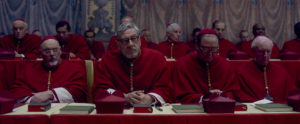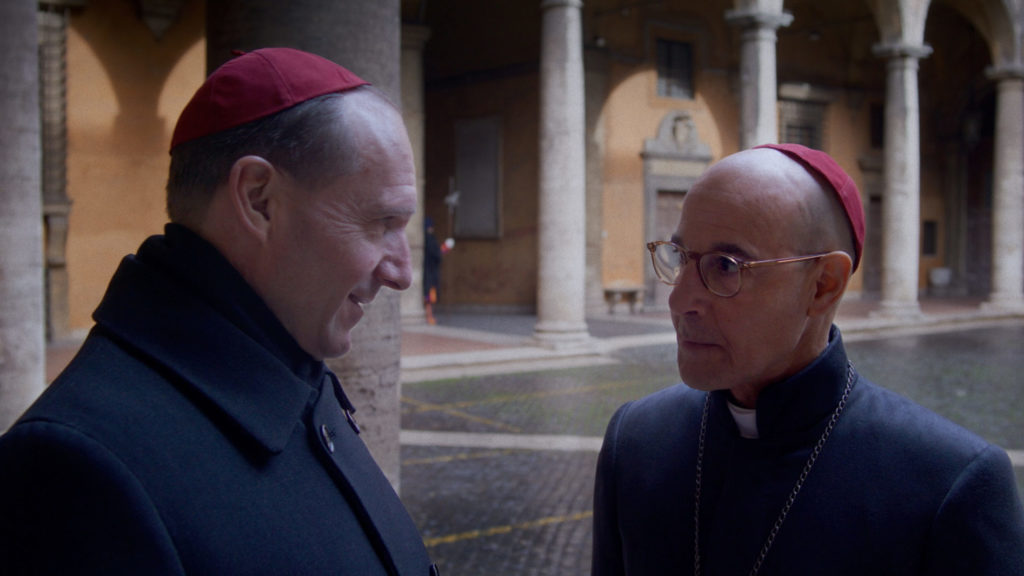Real conclaves can be long and boring. Films about them don’t have to be.
That’s one important takeaway from “Conclave,” a badly written, poorly researched, half-baked mystery that takes itself too seriously but turns at times into unwitting comedy. It is so simplistic, ignorant, and shallow that it feels like it was written for an audience of 12-year-olds.
Based on a novel by Robert Harris, written for the screen by Peter Straughan and directed by Edward Berger, “Conclave” opens in theaters Oct. 25.
Films about the Catholic Church are not rare, and not all of them are sympathetic. But most at least try to convey a sense of the complexities and mysteries of an institution that is thousands of years old. “Conclave” follows one of the world’s most secretive and ancient events — the selection of a new pope.
Besides a few respectable performances from a more-than-respectable cast, all “Conclave” has to offer is a rather predictable plot, cardboard characters, and a whole lot of cliches and stereotypes. The problem here is not that it is full of bias against the Catholic Church. The problem is that it is just plain bad.
A hundred cardinals are locked together in a convent; only one will be elected pope. Cardinal Lawrence (Ralph Fiennes) oversees the process. The setting is that of an Agatha Christie mystery, except you need to figure out the next pope, not the assassin (alert: spoilers ahead).
Who will it be? The ultra-conservative Italian cardinal (Sergio Castellitto), who loves the Latin Mass and hates immigrants? The kindhearted African with a difficult past (Lucian Msamati)? The consummate curial schemer (John Lithgow) or the seemingly attractive and liberal cardinal that the protagonist roots for (Stanley Tucci)?
The plot gives away the assassin (I mean the next pope) at around minute 12. When a mysterious cardinal turns in unannounced — the archbishop of Kabul, Afghanistan, whose appointment the former pope has kept secret (a real practice known as in pectore, done by popes even in the modern era) — you know right away he is the chosen one.
Why him? All the others care about money and power, he cares about the poor. All the others are corrupt and two-faced, he is not.
At the crucial moment, he gives a speech so full of platitudes it could have been written by ChatGPT. He declares that the Church is not the tradition, the Church is the future. We should love sinners, not condemn them. War is bad, peace is good, etc.

The only mysterious thing about this movie is how they selected the filming locations. The cardinals are housed in a convent that looks like a cross between a 2-star hotel and a morgue. Why are the walls covered in gray marble? Puzzlingly (but conveniently) they are all staying next door to the room in which the pope dies (same convent) and where the secrets for the big reveal are kept.
Most of the convent scenes appear to have been shot in the EUR suburb of Rome, the city’s business district built by the Fascist government in the late 1930s, one of the few modern-looking neighborhoods in Rome.
The white colonnades you see in the film are Fascist architecture recreations of Greco-Roman buildings. Literally any other part of the almost three-millennia-old city of Rome would have worked better.
Predictably, the conclave is all about politics and ideology. That is fair enough, of course, and could have made for some good intrigue. Instead, it is all so unimaginative, full of implausible twists. If you want to write cardinals as villains, make them good villains.
All they could come up with was cash payments. The bad cardinal played by Lithgow wired his friends money to get them to vote for him. At least, he could have given them cash! Cardinals may be corrupt, but they are not that stupid. It did not occur to the writers that matters might be slightly more complex in the Vatican and its politics.
A little research would have helped — even just some basic knowledge of recent Vatican news stories involving power and money (think the Cardinal Becciu affair).
The ideologies at stake are even more implausible. The ultra-conservative Cardinal Tedesco is concerned that there are too many Muslims in Europe, and that the Church is too tolerant of other religions. Who in 2024 is so uninformed to imagine that the relationship with other religions (or the Muslim world) is at the top of the list of ideological clashes within the Curia?
How is the plot discovered? The dying pope has hidden a written report incriminating the villain in his bed frame. The secret note left by the victim, retrieved by chance, solves the mystery. How is that for a cliché?
Then comes the final twist: the windows of the Sistine Chapel are broken, the wind of the Holy Spirit blows in, the underdog is elected. Except, in a completely gratuitous plot twist, the new pope is revealed to be an intersex individual. The film has been poking fun at the expense of these corrupt, moronic cardinals. It turns out that God is playing jokes at their expense as well: the savior of the church of men is in fact a biological woman.
I am not surprised that a movie so bad was produced. I am surprised to see a respected cast of actors associated with such uninspiring material.

